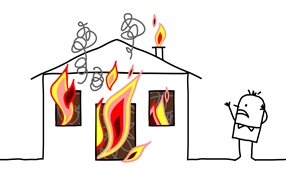Could it be Your Fault?
 Blaming others when things go wrong is a natural first instinct. What isn’t so natural is stopping to think of what part you played in the “thing” that is now spiraling out of control. I read a cool article by Kevin Sharer, the former CEO of Amgen, who had an epiphany during a crisis and took a long hard look at where he contributed to that crisis (Harvard Business Review, Blame, February 2014). When he took inventory of the events that occurred and the part he played in each of those events, he realized the new behaviors that needed to be put into action immediately. The first of those was to go to his team and admit his participation in the crisis and take ownership of it. Immediately, tensions eased and together they were able to develop solutions to resolve the crisis. As a manager, what part do you need to own when your department or project team hits a snag? Let me just say, the sooner you get to what part of the blame you should own the quicker you will be to solving the issue, and a bonus might just be strengthening your team in the process.
Blaming others when things go wrong is a natural first instinct. What isn’t so natural is stopping to think of what part you played in the “thing” that is now spiraling out of control. I read a cool article by Kevin Sharer, the former CEO of Amgen, who had an epiphany during a crisis and took a long hard look at where he contributed to that crisis (Harvard Business Review, Blame, February 2014). When he took inventory of the events that occurred and the part he played in each of those events, he realized the new behaviors that needed to be put into action immediately. The first of those was to go to his team and admit his participation in the crisis and take ownership of it. Immediately, tensions eased and together they were able to develop solutions to resolve the crisis. As a manager, what part do you need to own when your department or project team hits a snag? Let me just say, the sooner you get to what part of the blame you should own the quicker you will be to solving the issue, and a bonus might just be strengthening your team in the process.
Ann Banning - Wright

